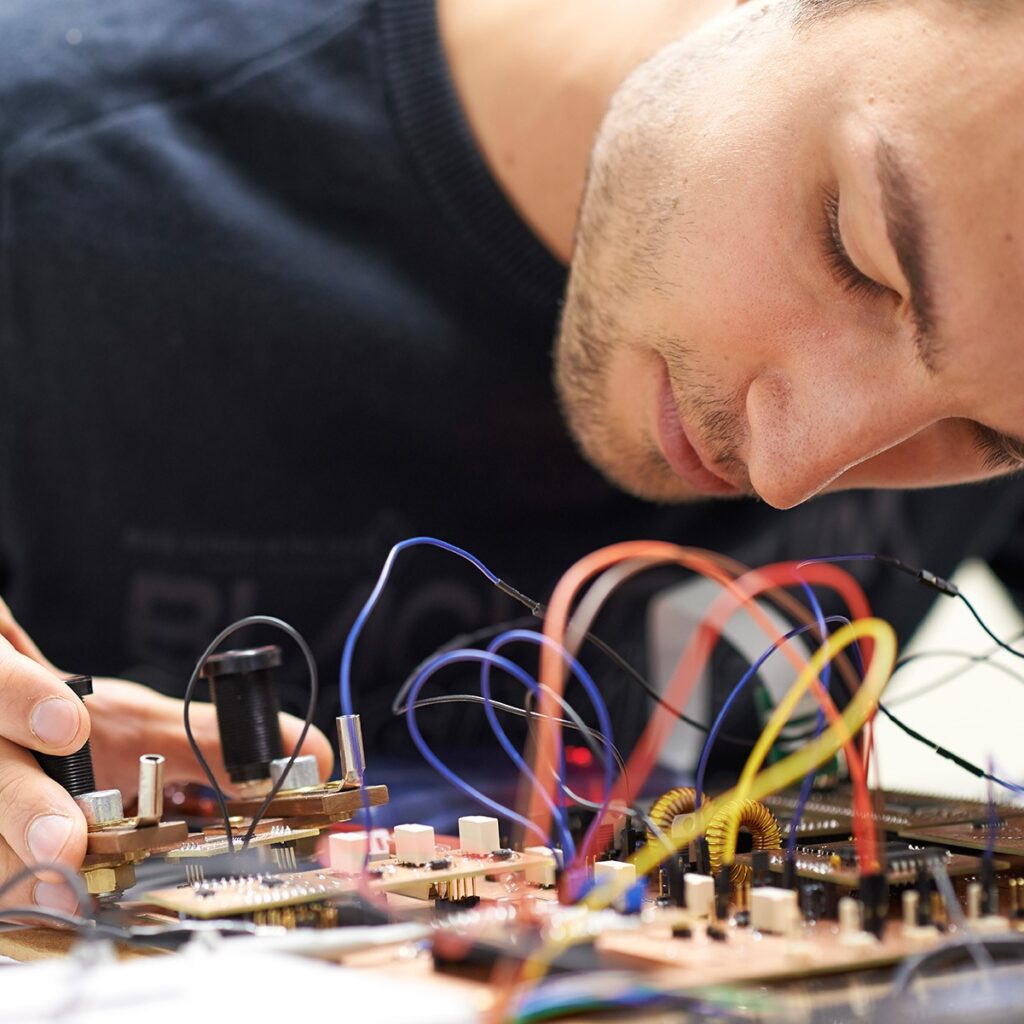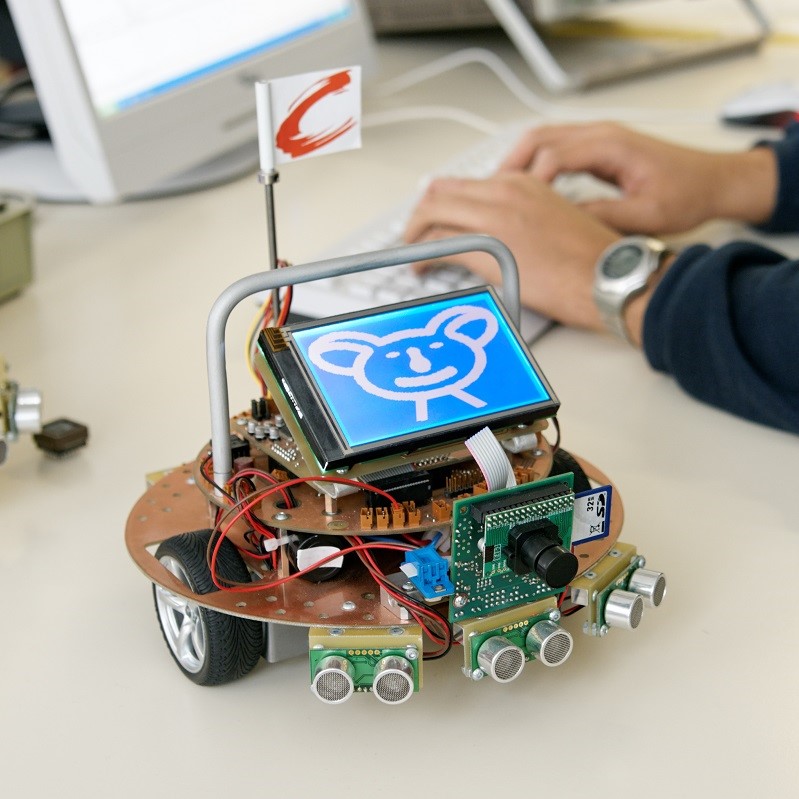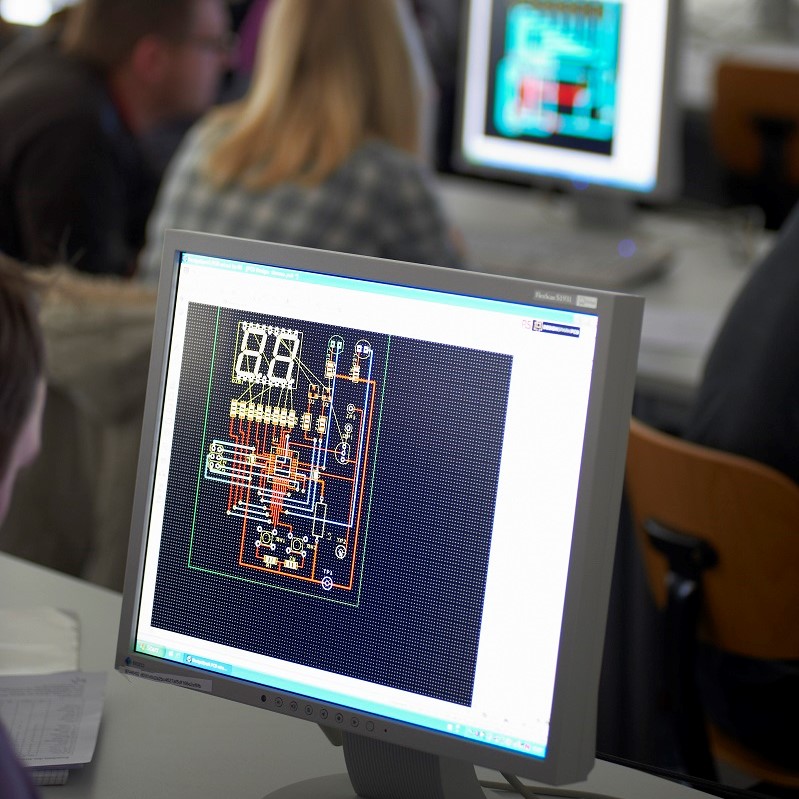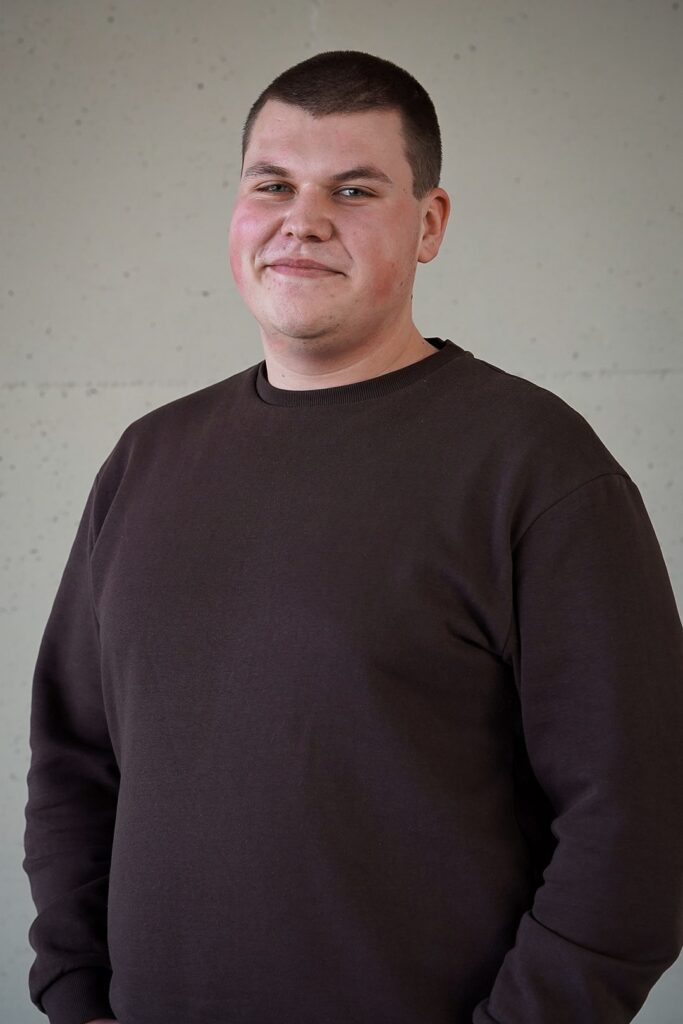Electrical engineering and information technology
At a glance
Academic degree
Bachelor of Engineering (B.Eng.)
Form of study
Full-time
Standard period of study
7 semesters (incl. practical semester), 210 ECTS
Place of study
Language of instruction
German
Start of studies
Winter semester (October 1)
Admission requirements
University entrance qualification, entrance qualification for universities of applied sciences, vocational qualification or foreign educational certificate
Orientation semester
Individual modules can be taken as part of an orientation semester
Semester abroad
Possible as a theoretical or practical semester
Studying with a practice partner
Accreditation
accredited by the Accreditation Council
Registration
from 02.05. – 30.09.
Profile of the degree program
Electrical engineering is an essential basic technology of today’s society. Energy technology and information transmission/information processing are no longer conceivable without electrotechnical processes.
“In principle, everything works, but almost nothing works without electricity.”
On the Electrical Engineering and Information Technology course, students acquire sound skills in electrical engineering, electronics, information and communication technology, signal processing and hardware-related microcomputer technology (“embedded systems”).
This enables them to quickly familiarize themselves with specific, practice-oriented tasks in specialist areas of electrical engineering.
What we value
Projects
The course is specifically geared towards the requirements of professional practice. Students also work in teams with students from other degree courses and thus train their social skills. Concrete projects with partners from industry challenge students to present the results of their work with confidence and create contacts with practice. In addition, almost all courses are accompanied by exercises in which students can apply their theoretical knowledge in practice.
Study internationally
Coburg University of Applied Sciences offers the opportunity to complete a study or practical semester abroad. To this end, Coburg University of applied sciences and arts maintains relationships with foreign partner universities. Further information is available from the university’s Study Abroad service.
Course content and schedule
In the first stage of the course (semesters 1-3), students refresh their knowledge of mathematics and computer science from school and are taught further mathematical, scientific and electrical engineering fundamentals. Even in this phase of the course, we place great emphasis on practical courses in order to establish an application focus. Many of the subjects in these semesters have a laboratory component of around 25 percent.
The fourth semester is the practical semester, which must be completed in industry or public institutions outside the university. Here, students not only consolidate what they have learned so far, but also establish contacts with potential employers.
Semesters 5-7 build on this solid foundation to teach the skills required to solve engineering tasks in electrical engineering, electronics and information technology. In these semesters, students can choose from various application-oriented fourth subjects. The course concludes with the Bachelor’s thesis. It can be completed at the university and/or with external partners in industry or public institutions.
1st to 3rd semester (foundation course)

- Introduction to electrical engineering and information technology through a thematic lecture series and in-depth laboratory practice
- Mathematics and programming
- Direct and alternating current theory and statistical electric field
- Magnetic field and induction
- Electronic components and circuit technology
- Electrical measurement technology
- Computer engineering and digital technology
- Microcomputer technology
- Electrical drives and grids
- Signals and systems
- Four poles and wave propagation
5th to 7th semester (specialization studies)

- Control engineering
- Electronics
- Signal processors / Digital signal transmission
- Digital Hardware Design
- Digital system integration
- Communications Engineering / Communication Systems
- Engineering project
- Technical English
- Interdisciplinary key qualification
- 5 elective subjects from the field of electrical engineering and information technology
- Bachelor thesis with bachelor seminar
Practice during studies
Basic internship
A basic internship is not required. However, we recommend that you do some practical work in relevant companies before starting your studies so that you can get an idea of your future professional practice in good time.
Practical semester
The practical semester usually takes place in the fourth semester. It comprises a continuous period of around 20 weeks. During this time, students also attend practical courses lasting around two weeks.
Study program with in-depth practical experience (PraxisPLUS)
Studying with in-depth practical experience in the PraxisPLUS model offers you the opportunity to gain more practical experience during your studies – without extending the duration of your studies. The prerequisite is a work contract with a company/institution.
You can apply your knowledge from the lecture directly at work. The work in the company is remunerated. This in turn makes it easier to finance your studies.
Job & Career

The job market opportunities and earning potential for well-trained electrical engineers are very good. During the practical semester and the industry-related Bachelor’s thesis, students establish contacts with industry at an early stage. Graduates can work in areas ranging from research and development, production planning and quality assurance to technical sales in various sectors.
In particular, people who have studied electrical engineering and information technology in conjunction with a practice partner (PraxisPLUS) are recommended as the managers of tomorrow thanks to the combination of training and studies. Their areas of application lie particularly in project planning, production planning and quality assurance as well as operational management.
Do another master's degree!
After successfully completing their Bachelor’s degree, good graduates have the opportunity to gain further qualifications with a Master’s degree. They follow on directly from their Bachelor’s degree. Coburg University of applied sciences and arts offers several Master’s degree courses for this purpose. You can find an overview of which Master’s degree courses you can combine with your Bachelor’s degree here.
Coburg University of applied sciences and arts offers an interesting model with the so-called Project Master: Master’s students work for three semesters on a scientifically demanding project, which can be based either at the university or with an industrial partner. The students are continuously supervised by a professor while working on the project.
Insights
You are currently viewing a placeholder content from YouTube. To access the actual content, click the button below. Please note that doing so will share data with third-party providers.
More InformationCurriculum and examination regulations
The study plan provides an overview of the structure of the degree program. The module manual provides information on the content of the individual modules. The study and examination regulations form the legal basis of the degree program. Questions about the content of the course can be answered by the course director Prof. Dr. Matthias Mörz.
Study Ambassador



